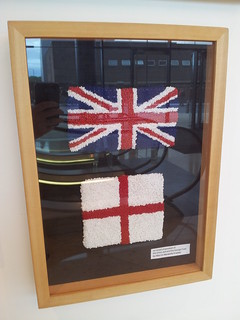New word needed: Englandic

Andrew Lilico has written a piece on Conservative Home about his confused sense of identity and about his independence angst:
I am a Scots Briton from New Zealand. […] When I came to live in Britain as a boy, I was not eligible for a British passport (though I have one now), as my family had been in New Zealand for many generations, but there was no doubt that I was British and that this was the Mother Country. […]
I was raised in Chester, near Wales not Scotland, but as a Scots Briton from New Zealand that seemed no less natural a way to “return to the Mother Country” than living anywhere else in Britain. I have never thought of myself as “English”. To me “English” has always been a racial designation, and the English a tribe […]
If Scotland were to become independent, who would I be? […] As a Scots Briton born in New Zealand who happens to live in England-and-Wales (Northern Ireland would presumably depart to join Scotland in due course), why would I think of myself as English, then, any more than, say, European?
Mr Lilico seems to be using ‘English’ and ‘Scottish’ as ethnic labels, in the same way as Americans use European ethnonyms to describe their ancestry even if they haven’t left the US for generations. In other words, ‘British’ is used to denote the citizenship, and this can then be further qualified (e.g., ‘Scots British’, ‘English British’, ‘Asian British’ or ‘Black British’). I presume he would not approve of somebody describing themselves as ‘Italian Scottish’ or ‘Pakistani Scottish’.
However, this is not how ‘Scottish’ is used in Scotland today. For instance, Ruth Wishart recently defined a Scot as follows:
A Scot is someone born here, and anyone who has paid us the compliment of settling here.
In other words, ‘Scottish’ is now used in Scotland in a similar way to how ‘British’ is used in England (or at least in London), and people do indeed happily describe themselves as ‘Italian Scottish’ or ‘Pakistani Scottish’.
(My beloved wife has a theory that the definition of ‘Scottish’ changed with the influx of the West Coast Italians after World War I, because so many Glaswegians spent their holidays there, and this made them become part of the Scottish family.)
The distinction many people from England make between ‘British’ and ‘English’ reminds me of the distinction in Russian between российский and русский (both normally glossed as “Russian”). The word “российский” rossíjskij means belonging to Russia, as a citizen or resident regardless of ethnicity, while the word “русский” rússkij describes ethnic East Slavic Russians only, but not other ethnic groups in Russia.
I wonder what England will do once Scotland, Wales and Northern Ireland have all left the UK (as I’m sure will happen once Scotland has taken the first step). Will they still call their country (South) Britain to allow themselves to preserve the distinction between ‘British’ and ‘English’? Or will they need to coin a new word to cover a citizen of England who isn’t ethnically English (e.g., ‘Englandic’)?
I don’t think anybody in Scotland feels a great need to introduce the word ‘Scotlandic’ to express this difference. Scotland has always been a country of emigrants and immigrants — a multilingual, multiethnic and multireligious place. A Scot is indeed someone born here, and anyone who has paid us the compliment of settling here.
Addendum (12/04/14): Some rather interesting maps have been published by BBC News, which I think confirm what I wrote here.
@AndrewLilico I’ve written a blog post inspired by your recent post on Conservative Home: http://t.co/qS0ZIHrk05
@Scotsfox At least it inspired me to write a blog post: http://t.co/oPQ2m14Pij
RT @arcofprosperity: @Scotsfox At least it inspired me to write a blog post: http://t.co/oPQ2m14Pij
That would be outlandic.